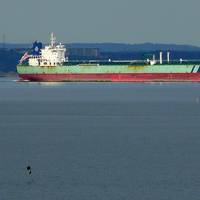'External source' Causes Explosion, Fire on Oil Tanker in Saudi Arabia

Shipping company Hafnia said on Monday that one of its oil tankers, the BW Rhine, had been hit by an unidentified "external source" that caused an explosion and a fire while the ship was discharging at Jeddah port in Saudi Arabia.The United Kingdom Maritime Trade Operations (UKMTO) said on its website that investigations into an explosion involving a tanker were underway, and that Jeddah's port was closed for an unknown duration."BW Rhine has been hit from an external source whilst discharging at Jeddah…
Carnival Princess to Pay Record $40 mln for Polluting the Seas
Carnival Corp's Princess Cruise Lines will plead guilty to seven felony charges for polluting the seas and deliberate acts to cover it up, and pay a record $40 million criminal penalty, the U.S. Justice Department said on Thursday. Shares of Carnival, the world's largest cruise operator, were down more than 2 percent at $50.29 in midday trading on the New York Stock Exchange after the announcement. The Caribbean Princess had been making illegal discharges since 2005 using bypass equipment - including a so-called "magic pipe" - to circumvent pollution-prevention equipment that separates oil and monitors oil levels in the ship's water, the department said.
Gray Water & Bilge Water: Taking Steps to Clean Up the Ocean Environment

The fact that improperly-treated gray water pollution is still being dumped off ships in a so-called modern and highly-regulated shipping industry is hypocritical at best. Graywater – which comes from ship accommodation areas (shower/sink), laundry, galley and food pulper – can contain classical pollutants such as nonylphenols, metals, nutrients, surfactants, pathogens, oil, grease, detergent and soap residue. Graywater is sometimes mixed with sewage, depending on the ship design. Graywater can have varying levels of harmful contaminants.
Ensolve Earns Type Approval
EnSolve Biosystems announced that it has received U.S. Coast Guard and International Maritime Organization (IMO) type approval for its new PetroLiminator® 100 Oil Water Separator. The PetroLiminator 100 uses a patented biotechnology process to remove oil and other hydrocarbon wastes from ships’ bilge water, so it can be safely discharged overboard in environmentally sensitive waters. The system contains safe, non-pathogenic bacteria that actually “eat” the oil, grease, transmission fluid and other hydrocarbons in the bilge water. The U.S. Coast Guard type approval certifies that the system meets U.S. and international clean-water regulatory standards for overboard discharge.
Carnival to Pay $18M for Oil Pollution
Carnival Corp. of Miami, Fla., which operates 40 cruise ships including those of the Carnival Cruise Lines, pleaded guilty on April 19 to falsification of oil record books on several of its ships. The company will pay $18 million in fines, $9 million of which will be used for a variety of environmental community service projects. Carnival was also ordered to implement and enforce a new corporation-wide environmental compliance program. The falsifications occurred on numerous occasions between 1996 and 2001, during which period employees ran fresh water past the sensors in the oil water separators of Carnival ships, generating false oil concentration readings. As a result, the sensors failed to activate a diversion valve which would have otherwise kept the contaminated water on board.
CGES Sees Oil Levels Nearing Minimum
Oil inventories are getting so tight that commercial stockcover held by oil companies could hit minimum operating levels by early next year, London's Center for Global Energy Studies warned. The CGES said that after a heavy draw in September, commercial inventories held in the industrialized nations of the OECD fell again in October - by an estimated 800,000 bpd in the U.S. and Europe. "What is more, there are hardly any spare stocks at sea, in temporary storage or in the non-OECD countries, the companies having run them down first before tapping their own inner reserves," said the CGES in a monthly report. "Now that middle distillates inventories are also declining the companies may well hit their minimum operating requirement of 50 days of cover some time in first quarter 2000…
CGES Sees Oil Levels Nearing Minimum
Oil inventories are getting so tight that commercial stockcover held by oil companies could hit minimum operating levels by early next year, London's Center for Global Energy Studies warned. The CGES reported that after a heavy draw in September, commercial inventories held in the industrialized nations of the OECD fell again in October - by an estimated 800,000 bpd in the United States and Europe. The OECD commercial stockcover has reportedly fallen from 57 days at the end of June to 54 days at the end of September and will reach 51 days at end-December. Worldwide stockcover was seen sliding from 85 days at end-June to 78 days at the end of the year.






